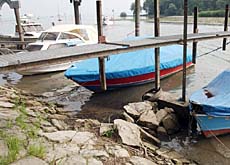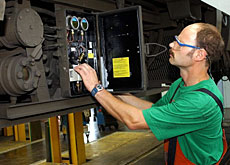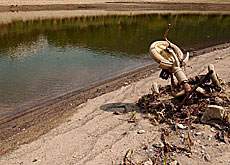Water levels plunge in summer heat

Europe’s heatwave is taking its toll on Switzerland’s rivers and lakes, many of which are running dangerously low as well as overheating.
Environmental experts are warning that if global warming continues it could have grave consequences for the country’s future water supplies.
Water levels in many of Switzerland’s rivers and lakes are at an all-time low, according to Christian Koch, a spokesman for the Federal Office for Water and Geology.
On Wednesday the Geneva authorities took the drastic step of banning swimming, fishing and boating across much of the canton to protect the environment.
“Some levels in the River Sense [central Switzerland] and the River Rhine just above Lake Constance are the lowest we’ve ever recorded in August,” he said.
“Rivers in the Jura mountains, lower Alpine regions and the plateau of central Switzerland are between one tenth and one third of the usual August average.”
Hot water
Europe has been sweltering through a heatwave – on Monday the mercury hit an all-time high in Switzerland of 41.5 degrees Celsius.
Weather forecasters said on Thursday that rain and cooler temperatures were expected in the next few days. But water temperatures in lakes will take some time to cool down – Lake Geneva reached 27 degrees Celsius this week.
“In [the River Aare in] Bern, it’s 23.3 degrees, which is a long-term record, and in Lucerne it’s 25.6, which is also a record. The highest water temperature we recorded was at the outflow of Lake Lugano, which is 30.5 degrees Celsius,” noted Koch.
Adrian Jakob from the Federal Office for Water and Geology said a third of the monitoring stations along Swiss rivers had charted record highs.
“All these points are situated in the middle of Switzerland – the Alpine regions are not as badly affected,” he told swissinfo.
Stressed fish
Warm water temperatures have “stressed” fish and many have been moved to cooler waters.
“The fish have less oxygen in the water and there are more instances of sickness due to a higher presence of chemical substances released in the water by treatment plants,” explained Jakob.
“If temperatures continue to soar over the coming years, fish species will change. For example, salmon will swim to higher regions and we won’t find them in the Aare river anymore,” he added.
Martin Beniston, head of geography at Fribourg University, believes the hot summer is not necessarily an indication of global warming. Nevertheless, Switzerland is definitely warming up, he says.
“If you look at the statistics from the last 100 to 150 years, average temperatures have increased by at least one degree and up to two degrees in some parts of the country. This is more than the global average warming which is about 0.6 degrees Celsius over the last 100 years,” he explained.
Mediterranean climate
According to Beniston, Switzerland is moving towards a Mediterranean climate of mild and rainy winters, and hot and dry summers.
“One of the most obvious impacts of this change will be on snow and ice,” he said.
“Some glaciologists have estimated that if warming continues at the present rate, up to 90 per cent of all glaciers will have disappeared by the end of this century. That has consequences for rivers.”
A lot of the run-off in river basins depends on the amount of snow that melts in spring. If there is less snow and if it melts earlier under future climate conditions, then the result will be less water, says Beniston.
“Of course this will force changes in Switzerland in the way we deal with our water supplies,” said Koch.
swissinfo, Samantha Tonkin
Temperatures in parts of Switzerland have reached 40 degrees in recent weeks.
The hot weather combined with little rainfall this year has caused water levels in many lakes and rivers to drop.
The heatwave has also sent water temperatures rising above normal, threatening fish.
Environmental experts have warned that Switzerland will need to rethink its water policy if global warming continues.

In compliance with the JTI standards
More: SWI swissinfo.ch certified by the Journalism Trust Initiative












You can find an overview of ongoing debates with our journalists here . Please join us!
If you want to start a conversation about a topic raised in this article or want to report factual errors, email us at english@swissinfo.ch.